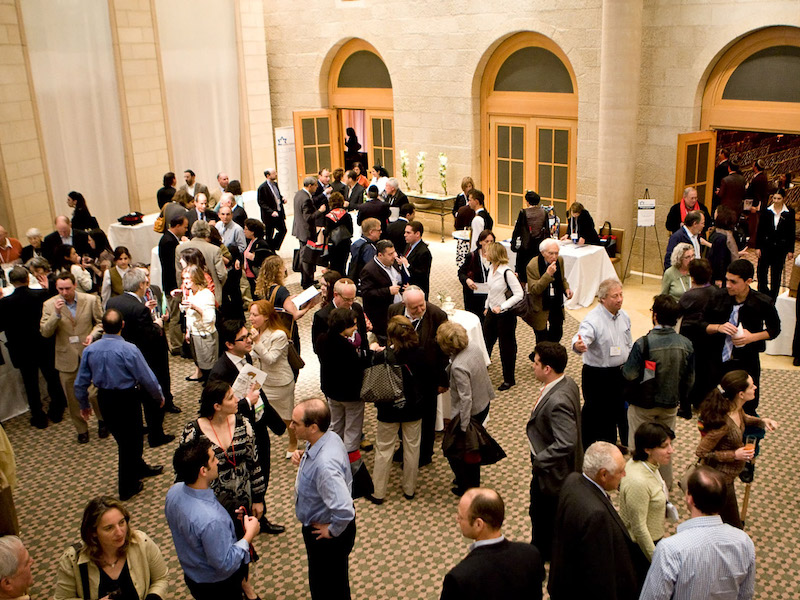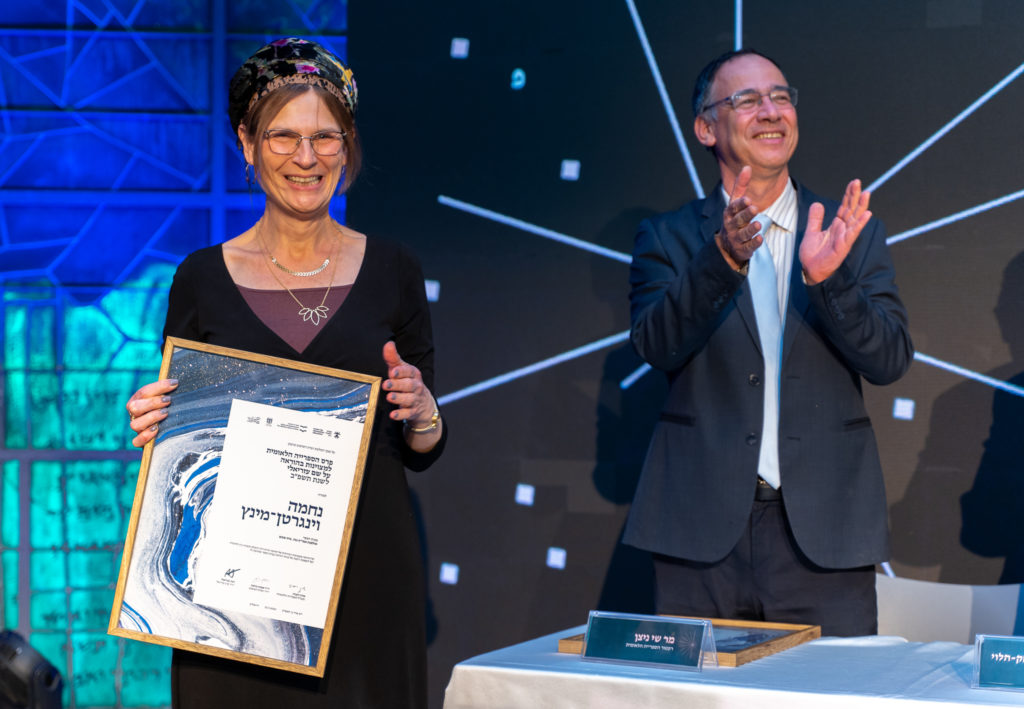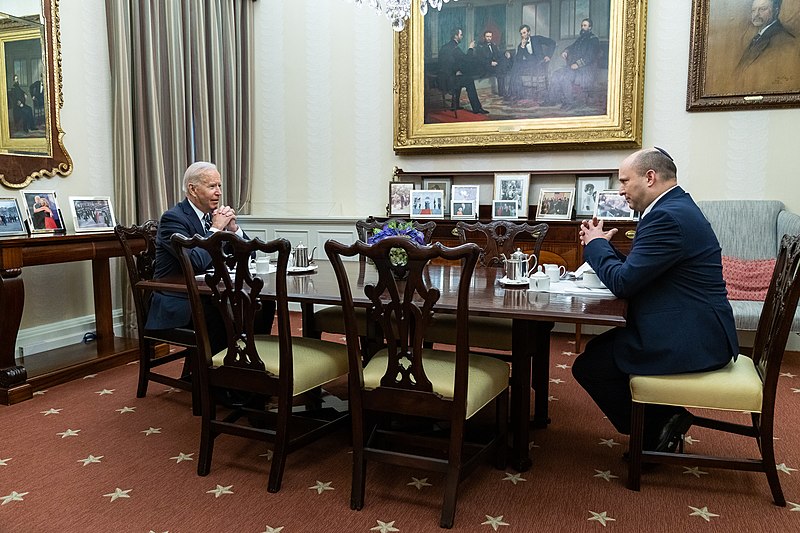Your Daily Phil: Previewing the upcoming Jewish Funders Network conference in Palm Beach
Good Friday morning!
Ed. note: From Sunday through Tuesday, the eJewishPhilanthropy team will be sending this newsletter from the sunny environs of the PGA National Resort in Palm Beach, Fla., where Dan Brown and Ben Sales will be covering the Jewish Funders Network International Conference. Today’s newsletter is a preview of the conference, and the next few editions will endeavor to be your eyes and ears at JFN’s first in-person confab since 2019. If you’re in Florida with us, come say hi!
The agenda of the upcoming Jewish Funders Network conference, the first to meet in person since 2019, runs from Sunday to Tuesday, and covers a slew of issues affecting global Jewry with an eye to how they affect Jewish donors’ priorities and practice. The agenda includes topics ranging from rising antisemitism to Israel-Diaspora relations to climate change. But when asked what they expect to talk about in the hallways, attendees who spoke with eJewishPhilanthropyfocused on two words: “Ukraine” and “COVID.”
“Part of it’s going to be Ukraine,” said Mark Charendoff, president of Maimonides Fund, when asked about the biggest issues facing the conference and its more than 500 attendees. He added that for philanthropists, a common thread runs through the war and the pandemic: “For funders who like to be strategic… to what extent do you allow an emergency to change your strategy? It’s been two years of emergency funding, whether it’s social services, whether it’s Jewish institutions because of COVID, Israel and now Ukraine. So it’s not just how much of our energy and resources should go into what seemed like immeasurable needs… [it’s] how do you prioritize?”
The burning question about Ukraine, said Idana Goldberg, the new CEO of the Russell Berrie Foundation, is what to do now that Jewish groups have already committed vast sums of aid to the region. “There is so much money right now, it feels like, going toward Ukraine, both on the ground in Ukraine, to border countries to address the refugees and aliyah to Israel. And I think there’s a real thirst to understand what others are doing, and what can we be doing together, to rationalize, perhaps, or to coordinate efforts in a meaningful way,” she said.
One attendee, who wished to remain anonymous to discuss a sensitive issue, said to expect chatter about the Genesis Philanthropy Group — and its three Russian Jewish co-founders who were sanctioned and recently resigned from its board. “I think this whole Russian oligarch thing is a crazy story, and I think it’s going to consume people in the quiet conversations,” the attendee said. “GPG is one of the biggest foundations funding Jewish life, and overnight it became kind of uncertain.”
The first thing attendees mentioned about COVID was how excited they were to be off Zoom: “Are we going to recognize each other from the neck down?” Goldberg quipped. JFN’s president and CEO, Andrés Spokoiny, compared meeting in person after two years of virtual meeting to “jumping for the first time into the swimming pool. You’re going to enjoy it eventually, but the first step is going to be hard.”
Funders also said they need to figure out how to internalize the lessons they learned during the virus’ early days and beyond: “I think that those kind of good grantmaking practices that became more prevalent during the pandemic — more listening to the grantees’ needs, more partnership with organizations, more general operating grants, lessening requirements — I really want to advocate for those practices to continue as we emerge, I hope, from this space,” said Lisa Eisen, co-president of Charles and Lynn Schusterman Family Philanthropies.
SETTING THE AGENDA
Inside the upcoming Jewish Funders Network conference


Courtesy of JFN
The world’s eyes might be on COVID variants and Ukrainian President Volodymyr Zelensky, but JFN CEO Andrés Spokoiny told eJewishPhilanthropy that, in his speech kicking off the conference on Sunday, he hopes to widen his lens beyond recent headlines.
Three relationships: “The pandemic accelerated and accentuated ongoing issues in the Jewish world, and I think that it’s time for boldness and for creativity and for openness to deal effectively with those issues,” he said. He plans to focus on three relationships Jews have that, he feels, encompass much of Jewish philanthropy: “The relationship the Jewish world has with the outside world, the relationship the Jewish world has within itself and the relationship they both have with Judaism. Ultimately, these three dimensions are somehow in crisis and the pandemic has accentuated and made those issues more dramatic.”
Weighty issues: Much of the conference’s subject matter isn’t exactly light. Beyond sessions on Ukraine and COVID, plenaries will tackle threats to democracy and the Abraham Accords that have normalized relations between Israel and several Arab countries. Additional sessions address climate change, antisemitism, poverty, impact investing, and other mainstays like Israel-Diaspora relations and intergroup relations in Israel and beyond. “During the pandemic, a lot of people turned inwards,” Spokoiny told eJP. “The past three years haven’t been kind to the idea of Jewish cohesiveness. It’s the pandemic, plus a very fractious election cycle plus a difficulty in having open conversation about difficult issues.”
Pushing for participation: On Sunday, JFN will also unveil an 86-page guide to participatory grantmaking, an approach that involves an expanded range of voices — including, potentially, those of grantees — in foundations’ grantmaking decisions. It comes at a time, the guide says, when foundations “are examining their roles in complex systems of power.” The guide says participatory grantmaking could bridge “the gap between grantmakers and those they serve, helping to include and/or empower the people affected by funding decisions to participate in the decision-making.”
PARSHA PHIL
Parshat Shemini: Acts of comfort, consolation and community


Getty Images
“Jews are called upon to support those who are suffering in real, tangible ways. Those who sat shiva in the time of the pandemic may remember the taste of homemade soup left on their doorstep by an anonymous chesed committee member, or the voices of nine other Jews, saying Kaddish in a virtual minyan that we could not have conceptualized just a few months before. Like stones on a grave, each tiny act of chesed — each tiny, unsung act with no thought of reward — built on every other, until the sum was much more than the parts ever could have been. Through small and large acts of philanthropy, a time of isolation and collective mourning sparked moments of great beauty,” Marcella White Campbell, former executive director of Be’chol Lashon, an organization focused on Jews of color, writes in eJewishPhilanthropy‘s weekly Parsha Phil column.
Giving selflessly: “Our commandment to give wholeheartedly of ourselves to the bereaved in our community is so strong that some went to extraordinary lengths to fulfill as much of the mitzvah as they could. This week’s Torah portion, Parshat Shemini, shows us just how much the Torah commands us to create these moments, by giving selflessly, to every Jew who is bereaved, even when we may be tempted to shun them, even when they do not seem grateful.”
‘Strange fire’: “In Parshat Shemini, the Jewish community, led by the newly anointed Kohanim, gather in the Tent of Assembly to offer a sacrifice and experience the spirit of God descend upon them. When the spirit does reveal itself, the entire people of Israel are overcome with joy and fall to their knees. Instead of kneeling, Aaron’s sons rush to offer their own “strange fire” to God. Their punishment is instantaneous: God strikes them dead and they fall to the ground.”
Debate over intentions: “There is debate around what this “strange fire” represents, but many sages believe that the two had good intentions. Perhaps they were punished for impulsively offering incense without their father and uncle’s instructions. We have all had the experience of giving gifts, money, or time with the best of intentions only to discover — horrified — that what we perceived as a selfless, even loving, act was received as offensive. Giving to others feels good; it has been shown to reduce feelings of depression and is even recommended as a partial cure for burnout. But giving without considering the needs of the receiver is counterproductive and can even cause harm. It’s difficult to reach for the humility that is needed to apologize when we meant so well but have still caused harm. And, yet, as we will see, we are not permitted to allow the fear of potentially offending others to keep us from giving.”
TIKKUN OLAM
Even though we’re little, we can do a lot


Courtesy
“There is a song we sing in our preschool with the lyrics, ‘Even though we’re little, we can do a lot…we can help to change the world from this very spot!’ Now, more than ever, I hear this song in my head as I reflect on the news I read every morning, reporting from across the world in Ukraine,” writes Jen Schiffer, an early childhood educator, in an opinion piece for eJewishPhilanthropy.
Core values: “As a Jewish preschool director, I often contemplate how to best teach children the importance of our core values such as tikkun olam (taking care of the world), chaverut (friendship), and tzedakah (giving). In the news and in our community, I see so many organizations looking to help the people of Ukraine – from medical supplies, to clothing to food – it’s hard to know what is needed most, and how best to help. In order to do something, and also to make it meaningful for our preschoolers, we went back to basics – Shabbat.”
Shabbat tzedakah collection: “On Shabbat each week, our students bring in tzedakah that is typically set aside until the end of the year, when the children collectively decide where they would like to donate it. In an effort to act immediately and meaningfully, we decided to devote a recent Shabbat tzedakah collection to be sent to Ukraine.”
Blue and yellow: “To add some ruach (spirit/breath) to the day, we invited students and staff to wear blue and yellow in solidarity with the Ukrainian people. Colors are a topic we teach even our littlest learners in the school. The colors blue and yellow can be found in the rainbow, are a part of the primary color series, and when mixed together make green. Children of all ages can connect to colors because we talk about them all the time, and they can be found all around us. In asking the children to wear blue and yellow, while simultaneously showing them the flag of Ukraine, we were able to open up a conversation, in a developmentally appropriate way, about the war, the country and its people who need our help.”
Worthy Reads
African tech for Israel: A Nigerian entrepreneur, Iyinoluwa Aboyeji, has launched a startup, TalentCo, that could connect tech employees in Africa to Israeli companies that may face workforce shortages due to the war in Ukraine, reports Gabby Deutch in Jewish Insider and The Circuit. “‘We prepare the engineers to be ready to engage with the Israeli ecosystem as ambassadors,’ said Aboyeji, explaining that the benefits go beyond just getting the African coders a job: They get to be ambassadors in Israel for Kenya or Nigeria or South Africa, and they also get an education-by-fire from some of the top startups in the world.” [JI]
Starting Up: Israel’s early-stage accelerator, Fusion, hosted a virtual pitch fest in February for its ninth batch of startups, 50% of which were founded by women, Debra L. Eckerling writes in Los Angeles’ Jewish Journal. Fusion works with early-stage founders to provide institutional capital and a support system to scale their companies in the United States. The program culminated in a rapid-fire virtual pitch fest: “Over the last two years, founders participated in a nine-week hybrid program: remote bootcamps in Tel Aviv (also in-person between COVID waves) and remote meetings with mentors and investors in the United States for office hours and feedback sessions. ‘What led me to Fusion was the desire to surround myself with like-minded individuals with similar ambitions to mine, and a cohort of brilliant investors who will be there to support me on my entrepreneurial journey,’ said [accelerator cohort member Noa] Cohen, who created Claire, a subscription-based, on-demand translation and localization platform. It combines human and tech capabilities, and offers real-time support for people who regularly work and communicate in English.” [JewishJournal]
AJU Cuts Tuition: American Jewish University’s Ziegler School of Rabbinic Studies has reduced its tuition from $31,342 to $7,000 a year, reports Jackie Hadjenberg in The Jewish Telegraphic Agency. The school is experiencing financial challenges: it shuttered its undergraduate program in 2018, sought renters for its space and, last month, announced that it would sell its 35-acre campus. “But American Jewish University administrators are betting that Ziegler’s new list price will draw more students, reversing a trend of declining enrollment that has contributed to the school’s financial crisis. Just four students enrolled at Ziegler this year; the school ordained only two new rabbis in 2021. They also say they want to be on the leading edge of a movement to make rabbinical school accessible to a larger and more diverse set of potential Jewish leaders.’” [JTA]
Community Comms
Be featured: Email us to inform the eJP readership of your upcoming event, job opening, or other communication.
Word on the Street
Lindsey Spindle has been appointed president of The Samueli Family Philanthropies…
Israel’s OurCrowd, an investment platform focused on startups, will open a global artificial intelligence (AI) innovation center in the United Arab Emirates’ capital of Abu Dhabi later this year. The center will provide finance-focused, AI-based research…
Myria, an online-only marketplace built exclusively for ultra-high-net-worth individuals and family offices, has launched. Its members-only website includes philanthropic and social impact opportunities that are generally not publicized…
Bethenny Frankel’s BStrong initiative has raised $85 million of its $100 million goal for Ukrainian aid…
The Rockefeller Foundation launched a three-year, $105 million initiative to increase access to healthy and sustainable food for 40 million underserved people around the world…
The William Penn Foundation announced grants totaling more than $4.6 million to 22 organizations in Philadelphia to help them implement free summer programming that builds academic and social-emotional skills for more than 29,000 children in 2022 and 2023…
The San Diego Symphony received a combined $2 million in donations from local philanthropists Dorothea Laub and Sheri Jamieson…
Pic of the Day


Itamar Ginsburg
Nehama Weingarten Mintz from Beit Shemesh’s Ulpanat Amit Noga school, one of three inaugural recipients of the National Library of Israel Prize for Pedagogic Excellence, given in honor of David Azrieli. The prizes are made possible as part of a five-year, $1.2 million gift from The Azrieli Foundation for the Israel National Center for Humanities Education at the National Library of Israel, the country’s training center for humanities teachers, which NLI runs in collaboration with the Ministry of Education.
Birthdays


Official White House Photo by Adam Schultz
Prime minister of Israel, Naftali Bennett…
Film and book critic, Gene Shalit… Rabbi, author and historian, Rabbi Berel Wein… Journalist and social activist, Gloria Steinem… Actor and director, Paul Michael Glaser… Mayor of Las Vegas, elected in 2011 and re-elected in 2015 and 2019, Carolyn Goodman… Senior fellow at the Carnegie Endowment for International Peace and global fellow at the Wilson Center, Aaron David Miller… Former member of the Knesset and later Israel’s ambassador to Belarus, Yosef Shagal… Chair of Eastern Savings Bank in Hunt Valley, Md., and chair of The Associated: Jewish Federation of Baltimore, Beth H. Goldsmith… Property manager and CPA, Glynis Gerber… Founding director of the initiative on communication and sustainability at Columbia University’s Earth Institute, Andrew C. Revkin… Columbus, Ohio-based consultant in the dental sleep medicine field, Cynthia S. Levy… Executive director at Plum Community Center in Pittsburgh, Karen Hochberg… Film producer and former co-chair of Sony Pictures Entertainment, Amy Pascal… Editor at Kaiser Health News, formerly healthcare editor for Politico Pro, Arthur Allen… Retired IDF major general, Yoav “Poli” Mordechai… Emmy Award-winning actress, producer and designer, Sarah Jessica Parker… Founding director of ATID and its WebYeshiva program and the editor of the Rabbinical Council’s journal “Tradition,” Rabbi Jeffrey Saks… Regional Director for New Jersey and Rockland County in the Orthodox Union’s Department of Community Engagement, Rabbi Avi Heller… President of Mizel Financial Holdings, Cheston David Mizel… Partner at DC-based Mehlman Castagnetti Rosen & Thomas, Lauren Aronson… Boston-based director of media and public relations at Oxfam America, Alissa C. Rooney… YouTube personality and filmmaker, Casey Neistat… Actress, comedian and author, Jenny Slate… Political editor at The Associated Press, Steven Sloan… Author of How to Fight Anti-Semitism and publisher of “Common Sense”, Bari Weiss… Communications strategist based in Chicago, Meredith Shiner… Political director of Democratic Majority for Israel, Joel Wanger… Legislative director for U.S. Sen. Jacky Rosen (D-NV), Grant Cameron Dubler... Manager of pricing strategy at Walmart, Jordan Rossman…
Saturday: President of the Palestinian Authority, Mahmoud Abbas… Argentine-born Israeli clarinetist who specializes in klezmer music, Giora Feidman… Actor who has appeared in more than 60 films since 1964, including as Sonny Corleone in “The Godfather,” James Caan… Award-winning novelist and poet, Erica Jong… Southern California resident, Martin J. Rosmarin… Retired ENT surgeon, author of five books and former medical correspondent at ABC News and NBC News, Dr. Nancy Lynn Snyderman… Chancellor of The Jewish Theological Seminary, Dr. Shuly Rubin Schwartz… President and CEO of the Ottawa-based Public Policy Forum, Edward Greenspon… Actress, in 2010 she was the winner of Season 11 of “Dancing with the Stars,” Jennifer Grey… Lori Tarnopol Moore… Patent attorney from Detroit, she currently serves on the Michigan State Board of Education, Ellen Cogen Lipton… Englewood, N.J., resident, Deena Remi Thurm… Co-founder of Google, Larry Page… Founder, president and CEO of Waxman Strategies, Michael Waxman… Talk show host who founded Israel Sports Radio, Ari Louis… Actress Carly Chaikin… Israeli judoka in the under 52-kg weight category, Gefen Primo…
Sunday: Music executive and chairman emeritus of Warner Brothers Records, he is a 2003 inductee into the Rock and Roll Hall of Fame, Mo Ostin (born Morris Meyer Ostrofsky)… Founder in 1961 of Business Wire, a news release service that he has since sold to Berkshire Hathaway, he has donated almost $800 million to charities, Lorry I. Lokey… Composer and violinist, he has been active in the presentation of new music and dance since the early 1960s, Malcolm Goldstein… Founder of one of the oldest and largest private equity firms globally, Thomas H. Lee Partners, Thomas H. Lee (family name was Leibowitz)… Former technology columnist for The Wall Street Journal and editor-at-large of Recode, Walter S. Mossberg… Executive director at Milwaukee’s Grand Avenue Club, Rachel Forman… Chairman and CEO of First International Resources in Fort Lee, N.J., Zev Furst… Sports agent who has represented the No. 1 overall pick in the NFL draft eight times, Leigh Steinberg… Host of the “Matty in the Morning Show” in Massachusetts on KISS 108, Matt Siegel… Deputy director of leadership giving at Baruch College, Linda Altshuler… Former member of the Knesset, Yisrael Eichler… Director of the Einstein Forum in Potsdam, Germany, Susan Neiman… Economist and banker in Latvia, Valerijs Kargins… Smooth jazz saxophonist, he has been recognized with a star on the Hollywood Walk of Fame, Dave Koz… COO of the Maimonides Fund, Daniel Gamulka… CEO of BBYO, Matthew Grossman… President of NYC’s Tenement Museum, Dr. Annie Polland… Founder and CEO of the Movement Vision Lab, Sally Kohn… Associate professor at Columbia University School of the Arts, Dorothea Lasky… Correspondent for NBC News and MSNBC, Jacob Hirsch Soboroff… Hitting coach for the Los Angeles Dodgers, he starred for Team Israel at the 2017 World Baseball Classic, Blake Shane Gailen… Adam B. Engel… Television and digital media producer, Daniella Greenbaum Davis…
Email Editor@eJewishPhilanthropy.com to have your birthday included.








